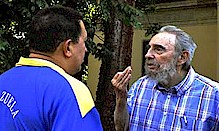
A meeting took place between former Cuban President Fidel Castro and Venezuelan President Hugo Chavez on November 9, 2010. The four-hour fraternal exchange was done in conjunction with the 10th anniversary of cooperation between the two states., a photo by Pan-African News Wire File Photos on Flickr.
Havana. June 14, 2011
11TH CUBA-VENEZUELA INTERGOVERNMENTAL COMMISSION
A unique cooperation mechanism between the two countries
MORE than 10 years of the joint construction of an unprecedented model of social justice, based on the will of the Cuban and Venezuelan governments and peoples, demonstrated its continuity on June 11 with the closing session of the 11th Cuba-Venezuela Intergovernmental Commission, created as part of the Integral Cooperation Agreement signed by Fidel and Hugo Chávez on October 2000.
Rafael Ramírez and Ricardo Cabrisas sign
the final minutes of the meeting.
During the three-day meeting, the delegations established the cooperation program for 2011 – covering 116 projects -- with the signing of 100 contracts, all of them directed toward relations of cooperation based on the sustainable development of the two nations, and not dominated by commercial interests.
"We have met in 11 commissions which have turned into a unique cooperation mechanism between our countries and which have strengthened the Bolivarian Alliance for the Peoples of Our America (ALBA) and our integration," affirmed Rafael Ramírez Carreño, vice president of government and Venezuelan minister of energy and oil, who chaired the meeting with Ricardo Cabrisas Ruiz, vice president of the Cuban Council of Ministers.
This mechanism has once again shown itself to be at a far remove from the demands and mandates of international financial organizations, as is the case with other underdeveloped nations, prevented from channeling their own resources into social policies.
That is why, after signing the meeting’s final minutes, Ramírez expressed his satisfaction at the results and noted that the 2011 program amounts to $1.3 billion.
"They are projects of great impact in Venezuela, closely linked to our social program, above all Barrio Adentro, medical supplies, specialized services that did not previously exist within our public health system, our educational missions, as well as productive sectors."
The cooperative contracts signed on this occasion are to be executed by 40 ministries in the two countries and are directed toward the strengthening of social programs.
Determined to continue developing economic links, the two sides expressed their satisfaction at the recent signing of memorandums of understanding to expand Cuba’s Cienfuegos refinery and construct a liquid gas plant on the island. As a guarantee of following up on these social projects of the Cuban and Bolivarian Revolutions, they agreed to hold the Commission’s 12th meeting in Havana, in the last three months of this year.
The events of last weekend in the Cuban capital are an expression of the will of the Cuban and Venezuelan governments to extend their complementarity to the benefit of the prosperity of their peoples.
The signing of agreements and contracts precedes the constitution of the Community of Latin American and Caribbean States (CELAC) in Caracas on July 5-6, highlighted during the meeting and its final minutes as an exercise in the genuine independence of our peoples; one without extra-regional interference or dictates. In virtue of this founding principle of the future organization, the Joint Commission document rejects the sanctions imposed on PDVSA by the U.S. government, as a flagrant violation of Venezuelan sovereignty.
Cuba and Venezuela have now moved even closer in their relations, which are growing both quantitatively and qualitatively, given that these are based on cooperation and mutual benefit.
Translated by Granma International
No comments:
Post a Comment